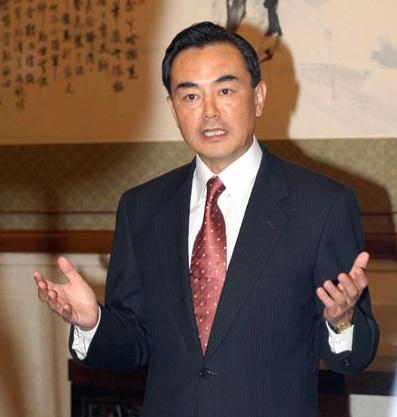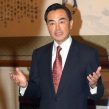
Major Country Diplomacy with Chinese Characteristics
Publication: China Brief Volume: 13 Issue: 16
By:

On June 27, China’s Foreign Minister Wang Yi gave a speech at the World Peace Forum on the new foreign policy concept called “Major Country Diplomacy with Chinese Characteristics” (Ministry of Foreign Affairs, June 27) [1]. Delivered at Tsinghua University in Beijing, the speech was presented to a domestic audience, but also was intended to communicate to the outside world the evolving contours of Chinese foreign policy under Xi Jinping. Comprehensive statements on Chinese foreign policy are rare; the last major exposition of Chinese policy was penned by former State Councilor Dai Bingguo in 2010 (Xinhua, December 6, 2010). Wang Yi’s speech reiterated several long-standing positions that suggest elements of continuity; included key concepts that were raised toward the end of the Hu administration; and introduced new themes that suggest potential changes in Chinese foreign policy priorities and style. Notably, Wang emphasized that Chinese diplomacy needs to be “proactive,” which, if not mere rhetoric, would mark a departure from Deng Xiaoping’s policy guideline “keeping a low profile” (tao guang yang hui).
The concept of major country diplomacy with Chinese characteristics was first mentioned in Chinese media early this year just days after the closing of the National People’s Congress. A Global Times editorial on March 19 asserted China should have a diplomatic strategy that “fits China’s national conditions and national goals. It cannot replicate the experience of any other big countries. It should be major country diplomacy with Chinese characteristics” (Global Times, March 19). Two weeks later, the more authoritative People’s Daily reported Wang Yi’s comments that Xi Jinping’s choice of Russia for his first trip abroad as president demonstrated the successful practice of “major country diplomacy with Chinese characteristics” (People’s Daily, March 31). That same month, Wang Yi told reporters at the Boao Forum that the meeting was a good testing ground for the “major country diplomacy with Chinese characteristics”—he did not, however, provide details (Hainan Daily, April 9). The June speech is the first major explication of the new concept and, thus, deserves in-depth analysis.
“Major country diplomacy” is the official Chinese translation (“daguo waijiao”), but the same characters can also be translated as “great power diplomacy,” which perhaps more accurately describes Beijing’s aspirations. In fact, in other instances, the first two characters daguo are translated in Chinese media as “great power,” such as Xi Jinping’s call for a new kind of “great power relationship” (daguo guanxi) with nations such as the United States and Russia.
Some of the features of “major country diplomacy with Chinese characteristics” outlined by Wang Yi are familiar, long-standing tenets of Chinese diplomacy. These include practicing the “independent foreign policy of peace,” adhering to the Five Principles of Peaceful Coexistence, opposing hegemony, respecting sovereignty and refraining from interfering in another country’s internal affairs. Also included are building a “harmonious world” and achieving “win-win progress,” concepts introduced by Xi’s predecessor Hu Jintao. These references make clear that core elements of Chinese foreign policy are not being jettisoned by the new administration, even as new concepts and/or rhetoric are adopted.
Wang put special emphasis on the role the developing world plays in China’s global interests and goals. Beijing consistently has touted its status as a friend and partner of the developing world, stressing that, as China grows, developing nations in particular will benefit. Responding to doubts expressed by both Western scholars and leaders in the developing world that China’s involvement in developing countries is benevolent, Wang attempted to reassure these nations that China will continue to aid and support them.
When referring to the maritime disputes China has with several Southeast Asian nations and with Japan, Wang reiterated the proposal that “parties could shelve differences and engage in joint development.” This policy, first put forward by Deng Xiaoping in 1979 and developed throughout the 1980s, signals that intractable disputes should be set aside to avoid undermining good relations between China and its neighbors (Ministry of Foreign Affairs, November 17, 2000). As maritime issues have heated up in recent years, domestic pressure on Chinese leaders has increased to abandon this policy. Many netizens and Chinese scholars would prefer a stronger stance on territorial issues, viewing the policy as too conciliatory and contrary to China’s interests. Wang’s reiteration of Deng’s stance—along with his commitment to pursue a peaceful solution to the South China Sea disputes and launch discussions for a Code of Conduct, which he conveyed on his May tour of four ASEAN nations—is evidence of a concerted effort to smooth tensions with China’s neighbors.
Wang’s speech also stressed the importance of some issues in Chinese diplomacy that have surfaced in recent years. With the growth of China’s involvement and presence abroad, protecting Chinese nationals overseas has emerged as an urgent priority. The 18th Party Congress Report stated “we have staunchly protected China’s interests and the legitimate rights and interests of Chinese nationals and legal persons overseas.” Wang went even further when discussing the growth of Chinese nationals traveling overseas for tourism, education and work. Wang stated the Chinese government “should give them reliable and strong backing” so that those traveling abroad also can achieve their own “Chinese Dream.” By referencing Xi Jinping’s call for the realization of the “Chinese Dream” of national renewal, Wang integrates the Chinese dream concept into foreign policy goals, encouraging Chinese citizens to strive to achieve their dreams both at home and abroad.
Wang also reiterated Xi Jinping’s call for a “New Type of Great Power Relations” (xinxing daguo guanxi)—now officially translated as a “New Type of Relationship among Major Powers”—highlighting both the United States and Russia as countries with which China seeks to establish such ties. He explained the new type of major power relationship between these states will contain elements of “mutual respect, win-win cooperation, no conflict and no confrontation,” applying core tenets of the Hu administration to Xi’s new concept. On the multilateral organizations front, Wang’s speech echoes the 18th Party Congress in identifying the UN, the G20, the Shanghai Cooperation Organization, Asia-Pacific Economic Cooperation (APEC) and BRICS as the organizations China will pay greater attention to in the future, leaving others, such as the East Asia Summit, conspicuously absent.
A few portions of Wang’s speech provided hints of new directions in Chinese foreign policy and are therefore important concepts to watch. As Wang admits in the opening sentences of his speech, China’s rapid growth and change that has prompted “thinking and exploring” about “what kind of foreign policy it will follow and what impacts will it have on the world.” While his speech does not offer a definitive answer, there is no doubt that a crucial component of China’s new foreign policy will be a more proactive approach to diplomacy. In the official translation of his speech, the phrase “active” or “actively” is used no less than 13 times. China is in a period in which it has dual identities, being both a “developing” nation and a major country or great power. Wang’s emphasis on engaging in proactive diplomacy signals a growing desire to move away from China’s reactive policies of the past.
One important development linked with this more proactive Chinese diplomacy is an official acknowledgement of rising global expectations for China to assume greater responsibility for addressing regional and global problems. In the past few years, Chinese scholars have called for China to make more contributions to global governance. In 2010, Shanghai Institutes for International Studies Fellow, now President, Chen Dongxiao argued there is a “significant gap between the strategic demand for China to share international responsibility and provide international public goods and our current strategic plans and implementation” [2]. Government officials continued to shy away from acknowledging these calls, however. In his 2010 article detailing China’s “Path of Peaceful Development,” State Councilor Dai Bingguo focused on reassuring the world that China would be a peaceful, cooperative growing power that would “never seek leadership, never compete for supremacy” (Xinhua, December 6, 2010). The 2011 white paper, China’s Peaceful Development, allowed that “as its comprehensive strength increases, China will shoulder corresponding international responsibilities and obligations,” but did not indicate that it was yet time to do so [3].
Wang’s speech signaled that China recognizes it must adopt a more active, rather than simply a prudent and self-focused, foreign diplomacy. He claims “China is ready to respond to the international community’s expectations” that it “undertake its due responsibilities and make greater contribution to world peace and common development.” Wang states that China is ready and eager to apply Chinese experiences and knowledge to international relations, taking a leadership role by providing public goods and participating further in global governance. These carefully crafted statements indicate global governance and greater leadership in the international community will be a key part of the policy of major country diplomacy with Chinese characteristics.
A concrete example of greater Chinese contribution to the international community is the first-time deployment of combat troops to a UN peacekeeping mission. While China has been hesitant in the past to make commitments to sending combat troops for fear of being accused of interfering in internal affairs, the arrival of several hundred Chinese peacekeeping troops in Mali this month is a sign of shifting policy. In addition to confirming this decision, Wang noted the larger role Beijing is beginning to play in the Middle East peace process. By championing Xi Jinping’s new four-point proposal for the settlement of the Palestinian question, Wang makes it clear that engaging in diplomacy in the Middle East is firmly on China’s agenda (Xinhua, May 6).
These expressions of China’s interest in participating and shaping the international community are coupled with an explicitly stated belief that the international system is in need of “reform and improvement.” Perhaps in response to fears that Beijing will seek to overturn the prevailing global structure and decision making system, Wang pledged China will “continue to maintain the present international order” from which it has benefited enormously. He added, however, that the global community “is going through a deep crisis of thinking and culture in modern civilization” and, therefore, needs to rethink and revise some aspects of the international system. Wang is silent on exactly what changes China seeks and how aggressively Beijing will push for them.
Notes:
- Wang Yi, “Exploring the Path of Major Country Diplomacy with Chinese Characteristics,” Remarks at the Second World Peace Forum, June 27, 2013, Available online <https://www.fmprc.gov.cn/eng/zxxx/t1053908.shtml>.
- Chen Dongxiao, “New Development in Global Politics and Rethinking on China’s Multilateral Diplomacy,” Shanghai Institutes for International Studies, Undated, Available online <https://en.siis.org.cn/index.php?m=content&c=index&a=show&catid=15&id=104>.
- The September 2011 white paper, China’s Peaceful Development, is available at the web portal for the Central Government of the People’s Republic of China <https://english.gov.cn/official/2011-09/06/content_1941354.htm>.





